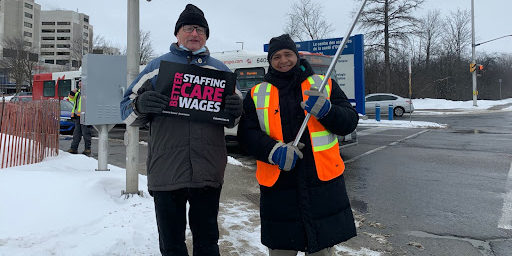Despite the snowy weather, nurses and their allies across Ontario took to the streets on Thursday, February 23 to fight for higher wages and better staffing. The Ontario Nurses’ Assoication (ONA) hosted 40 “all-out pickets” to fight for a good deal for nurses who are feeling ‘disrespected’ according to ONA interim president Bernie Robinson.
“Nurses have found their voice,” said Robinson. “They have great solidarity among themselves, but also with other labour leaders and with the public.”
ONA’s Hospital Central Negotiating Team completed the first week of bargaining with participating hospitals on February 3. A bargaining update by ONA said that the union had “a challenging week of bargaining.”
“We have reached some agreement on very minor issues but we are only now entering into the exchange of proposals when it comes to monetary issues,” said Robinson. “I think it’s really too early to tell [how bargaining will go].”
Robinson highlighted that this is the first time that nurses will be freely negotiating after three years of wage suppression under Bill 124. She said this collective agreement is crucial to helping nurses catch up with inflation which would help recruitment and retention of nurses and improve patient care.
Doug Ford introduced Bill 124 in 2019. The bill capped potential annual wage increases for public sector workers at one per cent. The Ontario Superior Court ruled that Bill 124 is unconstitutional in November 2022. Now, Public sector unions are not limited in the wage demands they can bring to the table during negotiations.
READ MORE: Bill 124 decision a victory in fighting Ford’s “manufactured crises”
Investing in care workers will ease crisis
Amidst a health care human resource crisis, and hospital wait times reaching record highs in the fall, ONA says that investing in public health care will help to make these crises subside.
“I think it could happen really quickly,” said ONA Local 214 Bargaining Unit President, Karen McCoy. “Once you start making changes on the wages, you can start to bring back nurses that have left.”
Angel Paniagua Perez has worked at the Ottawa General Hospital for 15 years. He participated in one of the three “all-out pickets” happening in Ottawa because he has witnessed first-hand how working and care conditions have deteriorated in hospitals.
“I’ve been working there for such a long time and this is a time where the government has just made horrible working conditions for everybody,” Paniagua Perez said. “It’s hard to retain individual nurses and it’s hard to show people why they should go into nursing.”
Nurses are leaving faster than they are coming in and this is causing staffing shortages, Paniagua Perez said. He mentioned that he currently had a text on his phone asking him to work late the next day. He said this is just one example of the heavy demands nurses feel pressured to meet.
“I’m already exhausted. I don’t even want to look at my phone and see, ‘Do you want to come in and help?’ I am burnt out,” Paniagua Perez said.
Privatization fears continue to grow
Concerns are even higher after Doug Ford announced a plan to move more surgeries out of hospitals and into private for-profit health facilities. The government of Ontario said in a release that Ontarians will always be able to access these services “with their OHIP card and never their credit card.”
Despite the reassurances from the government, nurses have pointed out how this plan could increase pressure on public health care.
“The patients these facilities want are the people that are healthy, the ones that can leave after 24 hours,” Paniagua Perez said. “So the people they are seeing are healthy. The issue I see with that is that when there are complications, where will people go? They will go to the public health system. They are defunding the system needed to support these private places.”
ONA interim president, Bernie Robinson, said that to address these issues, nurses’ demands must be met.
To up the pressure on the government to respect nurses, public solidarity is important.
“All ordinary people should be out because all ordinary people use these hospitals,” said Nira Dookeran, the Green Party of Ontario candidate for Ottawa South.
Dookeran came out in solidarity with nurses not just as a member of the Green party but also as a retired teacher.
“The way that the Ford government is treating teachers, workers, organized labour in general and the have-nots in general is atrocious,” Dookeran said.
With the CUPE Ontario political actions that almost led to a general strike in recent memory for many, Dookeran said she wanted to maintain public sector solidarity. She said that the CUPE OSBCU bargaining journey showed that when organized labour comes together it can have a tangible effect on bargaining.
Bargaining continues on February 27 at the Sheraton Hotel in Toronto. Robinson said that ONA members are preparing for another picket that week as well.
“The Ontario Hospital Association and the government need to see and understand that collective voices have come together to speak out against the disrespect of nurses,” Robinson said.



